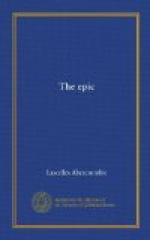Epic poetry, then, as distinct from mere epic material, is the concern of this book. The intention is, to determine wherein epic poetry is a definite species of literature, what it characteristically does for conscious human life, and to find out whether this species and this function have shown, and are likely to show, any development. It must be admitted, that the great unifying poet who worked on the epic material before him, did not always produce something which must come within the scope of this intention. Hesiod has just been given as an instance of such a poet; but his work is scarcely an epic.[3] The great sagas, too, I must omit. They are epic enough in primary intention, but they are not poetry; and I am among those who believe that there is a difference between poetry and prose. If epic poetry is a definite species, the sagas do not fall within it. But this will leave me more of the “authentic” epic poetry than I can possibly deal with; and I shall have to confine myself to its greatest examples. Before, however, proceeding to consider epic poetry as a whole, as a constantly recurring form of art, continually responding to the new needs of man’s developing consciousness, I must go, rapidly and generally, over the “literary epic”; and especially I must question whether it is really justifiable or profitable to divide epic poetry into the two contrasted departments of “authentic” and “literary.”
FOOTNOTES:
[Footnote 1: hos d’ ote cheimarroi potamoi kat opesthi rheontes es misgagkeian xumballeton obrimon udor krounon ek melalon koilaes entosthe charadraes. Iliad, IV, 452.]
[Footnote 2: Etymologically, the “good” man is the “admirable” man. In this sense, Homer’s gods are certainly “good”; every epithet he gives them—Joyous-Thunderer, Far-Darter, Cloud-Gatherer and the rest—proclaims their unapproachable “goodness.” If it had been said to Homer, that his gods cannot be “good” because their behaviour is consistently cynical, cruel, unscrupulous and scandalous, he would simply think he had not heard aright: Zeus is an habitual liar, of course, but what has that got to do with his “goodness"?—Only those who would have Homer a kind of Salvationist need regret this. Just because he could only make his gods “good” in this primitive style, he was able to treat their discordant family in that vein of exquisite comedy which is one of the most precious things in the world.]
[Footnote 3: Scarcely what we call epic. “Epos” might include Hesiod as well as epic material; “epopee” is the business that Homer started.]
II.
LITERARY EPIC




